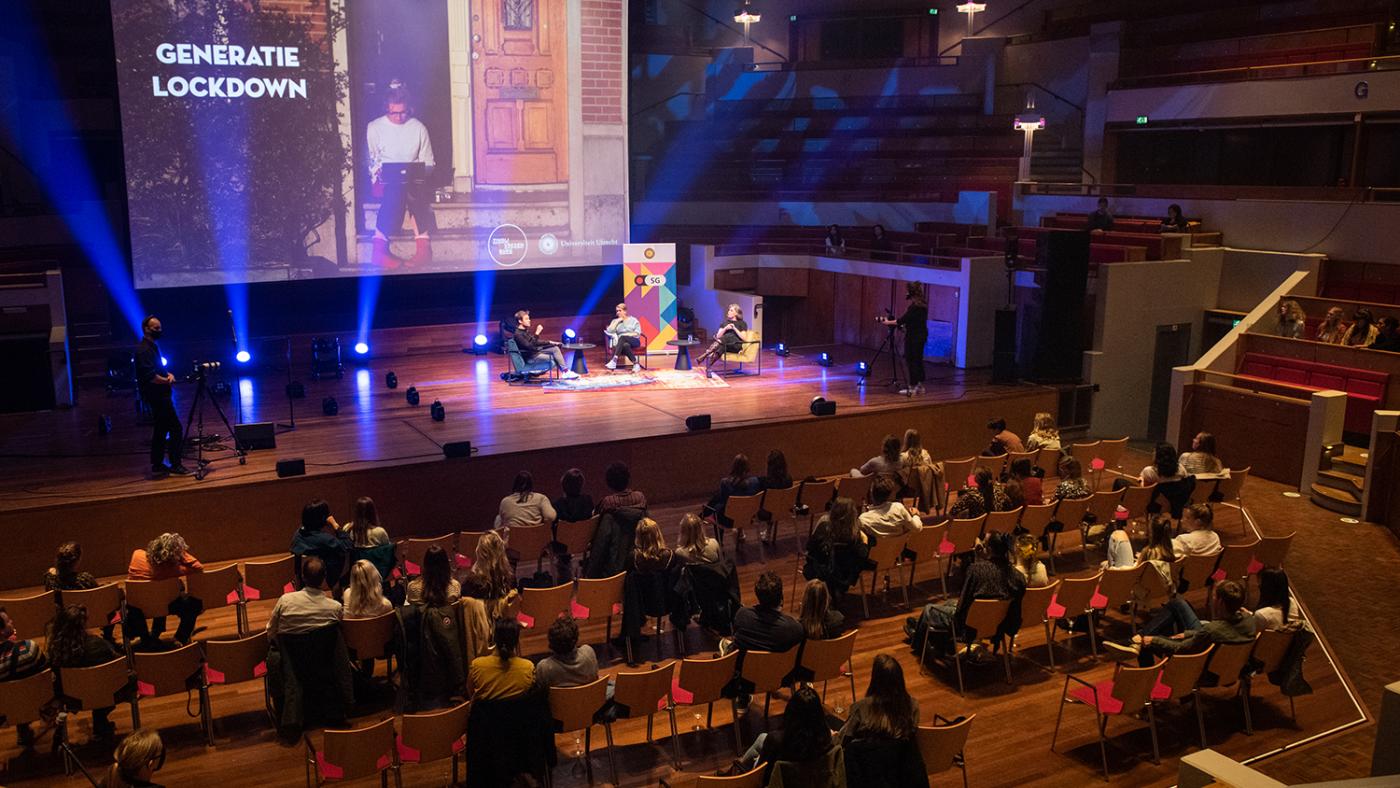Fieldlab Generation Lockdown: ‘Are we falling behind?’

The bar in the foyer is up and running and people gather in small groups, beers in hand. It's 7:30 pm when the doors to the venue open. A young man with a black shirt reading "Tivoli Vredenburg" addresses the visitors: "You can go in now, we're starting in fifteen minutes".
The entire audience has been tested negative for Covid and everyone’s wearing face masks as they walk towards the countless rows of chairs to find their seats. Of the 1717 red velvet chairs, only 250 to 300 are occupied. They're allowed to take their masks off once they sit down. Some audience members gaze at the brightly colored lights on the ceiling, but most contribute to the pleasant sound of murmuring and beer glasses clinking.
As the lights go out, the sound fades away slowly. "It's really taking me some time to get used to this”, someone whispers right before everything goes dark. It’s been a while since the last time Studium Generale organised an event for a live audience.
Trying times
A man enthusiastically walks onto the stage and addresses the audience. “Welcome to Generation Lockdown, chosen ones”, he says. The audience laughs. “Chosen ones”, someone in the top row repeats, “that's kind of how it feels”. The man introduces himself as Roel Maalderink, tonight’s host. He sits down on one of the three large chairs onstage, and announces the first guests: Veronique Scharwächter, student of Language & Culture and Philosophy, Politics & Economics; and developmental psychologist Odillia Laceulle, also from UU.
“Odillia, how is young people's mental health doing?”, Roel asks the psychologist. She shifts in her seat. “For many young people, these are trying times”. In her research on vulnerability, 40 percent of young people indicated feeling vulnerable right now. “I think young people can handle a lot. They can get through anything, but this is still hard”.
Is the pandemic making us fall behind?
The host turns to Veronique. “What can students do then, to become more resilient?” The UU student and co-author of the book Student thinking - a philosophical life guide’ (in Dutch) replies: “Many students feel lonely right now. Not just socially lonely, missing their friends, family, and loved ones, but also on an existential level”. She explains their struggles stem from the fact that we never really get to know the other. “You can really only know what’s in your own head. Because students often only have themselves around these days, they have nothing to distract them from these two types of loneliness”. Fighting existential loneliness is a lost cause, Veronique argues. “You should try to become one with that loneliness. You can do it by talking about it with others. You can’t change the loneliness, but you can change your attitude towards it”.
A question from the audience. The person asking it is in the top row and folds his hands around his mouth like a bull horn so the people on stage can understand him. “Is the pandemic making us fall behind?”, he shouts. “In your student days, you reach several milestones of growing up”, Odillia explains. “Starting romantic relationships, becoming independent, etcetera. Because everything’s on hold right now, that development stagnates, too. That’s no reason to panic, but it’s important to catch up at a later time”.
Getting tested in order to be admitted isn't "normal"
After an intermezzo, filled with a performance by spoken word artist Elten Kiene, two new guests make their way to the seats on stage: UU social scientist Linda Duits and law philosopher Nanda Oudejans from the University of Amsterdam.
“Nanda, you almost didn’t come tonight. Why not?” Roel asks. “I hesitated whether I should come or not, because it’s like this testing-to-be-admitted principle seems to be sneaking a certain permanence into a temporary measure. In the past twenty years, philosopher Giorgio Agamben has shown that when temporary emergency measures are announced, they often become permanent. The test-for-admittance law ends in 2022. Getting tested before you can enter some place isn’t ‘normal’, it robs you of the freedom and spontaneity that are at the core of being human. Suspending freedoms and rights ensures that a line of defence between you and the state is at risk of crumbling”.
Social scientist Linda Duits says these aren’t the only rights being taken away. “Sex is a human right. In the current Covid policies, that’s being completely forgotten. Because of the 1.5-metre rule, you can only have sex with your partner, the government states”. Linda says not only single people, but also those in long-distance relationships, polyamorous relationships, and those who live by themselves who are forgotten by the government’s policies. “Intimacy and closeness are elementary needs, they’re not just some extra that you can refrain from like that. We also really need to let go of the stigma surrounding single people who date during these times. The sentiment is like ‘because of you, grandmothers are dying right now.’ That’s why I proposed including a sex buddy or a cuddle friend in the policies”.
According to Nanda, there are many more who aren't being seen by the government. “I think that young people – those at secondary school and higher education students – are being forgotten completely. So far, they haven't been a priority in The Hague at all. That’s a shame”. The comment is met with loud applause from the audience.
During the applause, Roel thanks his guests and announces the closing song by Kiki Schippers. Before she’s even finished, a number of audience members begrudgingly leave the room. After all, it’s already past nine. “We really have to go or we won’t make it home before curfew.”
Photo: Anna van Kooij. annafotografie.nl